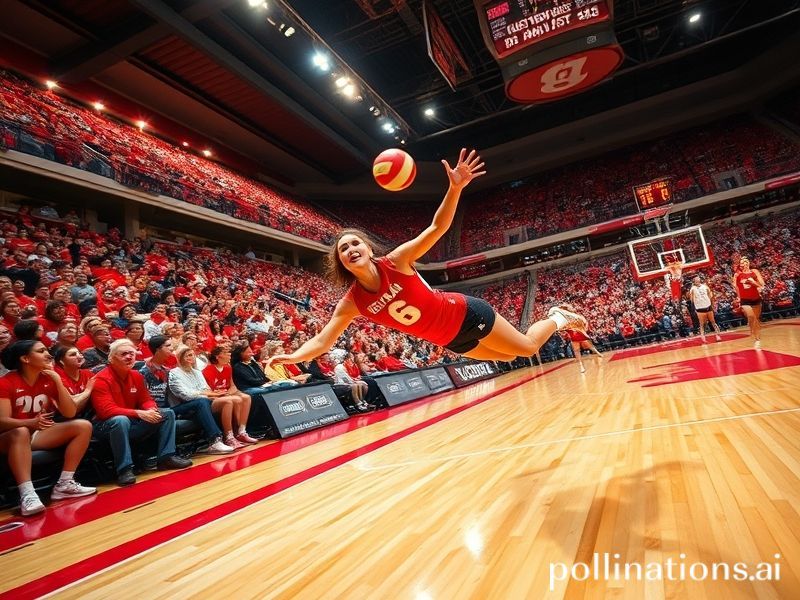How Nebraska Volleyball Accidentally Became a Global Soft-Power Superpower
Volleyball, the sport most often confused with an elaborate excuse to wear knee-pads, has found an improbable geopolitical epicenter in Lincoln, Nebraska—a city whose previous claim to global fame was inventing Kool-Aid. Yet inside the Devaney Center, 92,003 spectators recently set a world record for watching women slap a synthetic sphere back and forth, eclipsing even the most feverish rallies in Rio or Istanbul. If that makes you spit out your yerba mate in disbelief, congratulations: you are still capable of surprise, a dwindling currency in 2024.
To the international eye, the spectacle is both baffling and oddly instructive. While European clubs hemorrhage cash trying to lure 6’5″ Belarussian cannons with tax-free salaries and complimentary beet rations, Nebraska’s solution is simpler: corn-fed teenagers who learned vertical leap by vaulting irrigation ditches. The roster looks like a UN summit if the UN were staffed exclusively by polite, devastatingly efficient Midwesterners. Their libero, Lexi Rodriguez, traces her surname to Mexico; opposite hitter Bergen Reilly’s family tree sprouts Irish roots; and middle blocker Andi Jackson could start for the Australian national netball team tomorrow if she fancied switching to a sport whose chief thrill is watching people pivot. In other words, the Cornhuskers have achieved a sort of accidental cosmopolitanism—the kind that happens when your recruiting radius is “anywhere within a nine-hour drive and willing to endure January wind chill.”
Globally, the implications are deliciously ironic. China pours billions into state-run volleyball academies, scouting eight-year-olds the way Goldman scouts math Olympiad prodigies. Brazil’s beaches breed spikers like orchids. Turkey’s VakıfBank Istanbul signs megastars to contracts denominated in euros, tax optimization included. Nebraska counters with a training table of Runzas—yeasty meat pockets that double as edible hand warmers—and still crushes them all. The message is as subtle as a thunder spike: the age of hyper-specialized, data-driven, nutritionally optimized supremacy can, in fact, be derailed by a state whose population density is slightly higher than the moon’s.
Meanwhile, the FIVB—volleyball’s answerable-to-no-one governing body—watches the gate receipts the way oligarchs watch frozen assets. A single Nebraska home match out-grosses entire European leagues. The federation’s latest strategic plan, titled “Vision 2030: A Billion Hearts for Volleyball,” curiously omits any mention of Lincoln, perhaps fearing that acknowledging a landlocked prairie powerhouse might undermine the narrative that salvation lies in beach volleyball on the Seine during the Paris Olympics. Bureaucratic denial: the last truly international language.
One must also consider the soft-power dividends. When Iranian state television broadcasts Nebraska highlights—yes, Tehran now receives Big Ten Network via satellite—it discovers women competing in shorts without triggering a national fatwa. The Islamic Republic’s takeaway: American women can both spike and vote, sometimes in the same afternoon. Somewhere in Foggy Bottom, a State Department intern drafts a memo: “Export Cornhusker playbook to promote moderate values?” The intern’s supervisor, a Georgetown realist, adds a margin note: “Only if we can monetize ticket sales in rials.”
Of course, every empire peaks. Someday the Huskers will lose, the crowd will thin, and a new dynasty will rise—perhaps in Jakarta or Katowice. Until then, Nebraska volleyball serves as a gentle reminder that, in an era of drones, crypto, and whatever Elon Musk is calling Twitter this week, the world can still be upended by 18-year-olds who say “ope” when they accidentally bump into you. The planet teeters on any number of apocalypses—climate, nuclear, TikTok—but for three sets at a time, the most pressing question is whether the back-row specialist can dig a ball traveling 70 mph at her face. There’s something almost quaint in that, a throwback to when human drama didn’t require a subscription tier.
In the end, Nebraska volleyball is less about sport than about scale: a small place showing the world how large it can feel. If that sounds sentimental, remember that sentiment, like sarcasm, is merely another defense mechanism against despair. And anyway, the concession stands have run out of Runzas. The apocalypse can wait.







